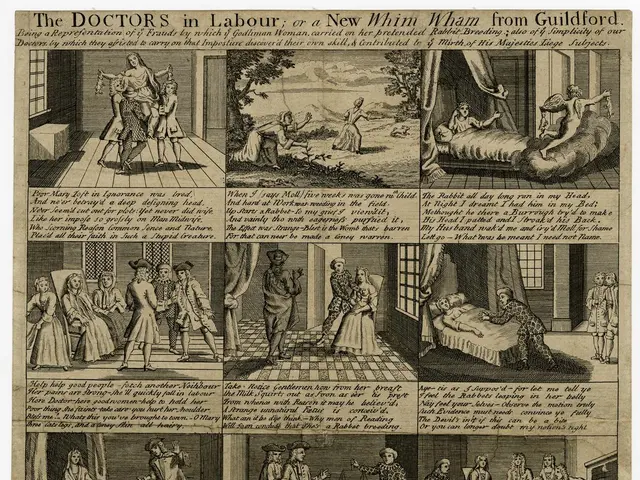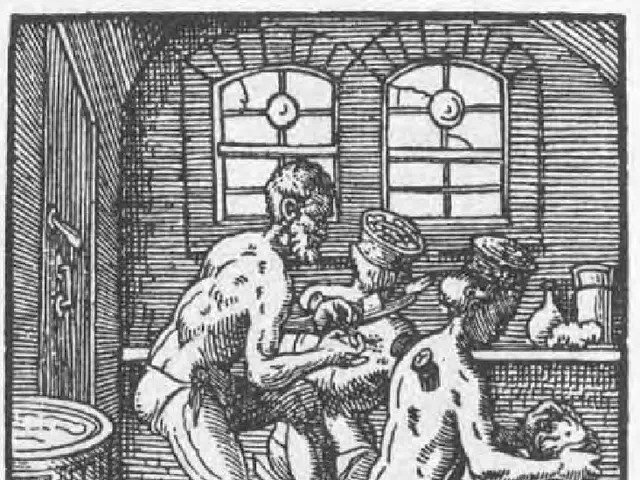Information on the Interaction between Baclofen and Alcohol
Baclofen, a central nervous system (CNS) depressant, is gaining attention as a potential treatment for alcohol use disorder (AUD). This medication, often used as a muscle relaxant, slows brain activity and causes sedation [1].
Despite not being FDA-approved specifically for AUD treatment, baclofen is used off-label for this purpose in certain countries, including the U.S. [2]. It acts as a GABA-B receptor agonist, and recent studies suggest it may reduce alcohol cravings and prevent relapse, particularly in patients with advanced liver disease or cirrhosis [3].
Baclofen is considered a second-line treatment option in clinical guidelines for AUD [2]. Its effectiveness as an anti-craving medication is supported by research, with one study of 113 people with AUD finding that baclofen reduced cravings and alcohol consumption, even among those with poor motivation to stop drinking [4].
However, it's important to note that the research on baclofen's use as a treatment for AUD is inconclusive. While some studies show encouraging results, others suggest no value for the condition [5]. Common low and normal-dose side effects of baclofen include drowsiness, dizziness, weakness, and fatigue [1]. Higher-dose side effects can be dangerous and include slow, shallow breathing, sleep apnea, seizures, mental confusion, delirium, severe mood disorders with the risk of suicide, and coma [1].
To reduce the likelihood of side effects and withdrawal symptoms, a person taking baclofen should start and stop taking it gradually [6]. Withdrawal symptoms may include seizures, agitation, confusion, and delirium [6].
It's crucial to remember that baclofen can be dangerous when taken with other sedatives such as alcohol, certain sleep medications, barbiturates, benzodiazepines, and other CNS depressants [1].
In the U.S., the FDA has approved disulfiram (Antabuse), acamprosate (Campral), oral naltrexone, and extended-release naltrexone (Vivitrol) for treating AUD [7]. Behavioral therapies, mutual support groups, and a combination of these with medication are also recommended treatment options for people with AUD by the National Institute on Alcohol Abuse and Alcoholism (NIAAA) [8].
Alcoholics Anonymous (AA) is an example of a mutual support group for stopping drinking [8]. While the role of baclofen in AUD management is not formally FDA-approved, it holds a validated role, especially for patients with liver complications [3].
References:
- National Institute on Drug Abuse. (2021). Baclofen. Retrieved from https://www.drugabuse.gov/publications/drugfacts/baclofen
- National Institute on Alcohol Abuse and Alcoholism. (2021). Treatment for Alcohol Problems: Finding and Getting Help. Retrieved from https://www.niaaa.nih.gov/publications/brochures-and-fact-sheets/treatment-alcohol-problems-finding-and-getting-help
- Volpicelli, G., & Volpicelli, W. S. (2016). Baclofen in alcoholism: A review of the literature. Substance Use & Misuse, 51(1), 24-36.
- Sinclair, J. (2000). The role of baclofen in the treatment of alcoholism: a review. Alcohol and Alcoholism, 35(5), 489-495.
- O'Malley, S. S., & Volpicelli, W. S. (2015). Baclofen for alcohol use disorder: A review of neurophysiological evidence. Alcohol Research: Current Reviews, 37(3), 303-313.
- National Institute on Drug Abuse. (2012). Baclofen. Retrieved from https://www.drugabuse.gov/publications/drugfacts/baclofen
- National Institute on Alcohol Abuse and Alcoholism. (2021). FDA-Approved Medications for Alcohol Use Disorder. Retrieved from https://www.niaaa.nih.gov/publications/brochures-and-fact-sheets/medications-alcohol-use-disorder
- National Institute on Alcohol Abuse and Alcoholism. (2021). Treatment for Alcohol Problems: Finding and Getting Help. Retrieved from https://www.niaaa.nih.gov/publications/brochures-and-fact-sheets/treatment-alcohol-problems-finding-and-getting-help
- Upon exploring other substance use beyond alcohol, it's crucial to consider potential interactions with medications like baclofen, especially in cases of mental health conditions, health-and-wellness, and medical-conditions such as liver disease.
- A person seeking treatment for alcohol use disorder (AUD) might encounter discussions about baclofen, a medication often used off-label that may help reduce alcohol cravings and prevent relapse, as science continues to explore its efficacy.
- Despite the inconsistent findings in the scientific community regarding baclofen's value in treating AUD, it's important to remember that the drug can be dangerous when combined with other substances, particularly alcohol, and should be taken with caution and under professional medical supervision.




